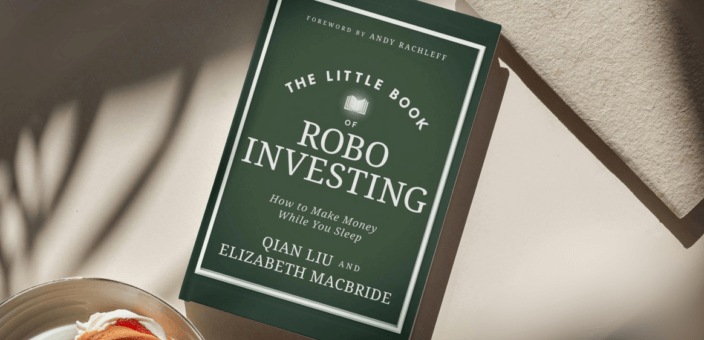The Little Book of Robo Investing by Qian Liu and Elizabeth MacBride (two founding members of the Wealthfront team) was released by Wiley earlier this month with a foreword by Wealthfront co-founder Andy Rachleff. We’re excited to share this excerpt of the book with readers of the Wealthfront blog. You can order the book here.
Chapter Nine: Investing Is Dating for the Long Term
If you’ve spent time on dating apps, you know how hard it is to judge a person by their profiles. The apps are great for short-term connections: you can tell whether someone is good-looking and likes to hike, dine out, or binge-watch TV. But if you want a connection that moves from the short term to the long term, you need another set of qualities entirely.
Dr. Shannon Curry, a forensic psychologist, gave us the best scientific definition of these qualities in a podcast episode.1 For a long-term relationship, you want someone who combines the physical attraction and the fun with three qualities: high on conscientiousness, low on neuroticism, and low-to-medium on novelty.
We think this is helpful to think about as you commit to staying the course on your robo investment strategy.
Misconception #11: Investing should be exciting, like day-trading or investing early in a new trend.
We humans are easily influenced by “happy hormones,” such as oxytocin, dopamine, and serotonin, released by our brains when we’re attracted to another person. These hormones give us a surge of positive emotions. However, they don’t last long. They tend to fade after about six months, and happy hormones are not good indicators for a long-term relationship. Good indicators are the three qualities that can be loosely interpreted as (1) be responsible, (2) be calm, and (3) be fairly boring, which are also exactly what you need to successfully invest your money for the long term.
If you operate under the misconception that investing early in a new trend and/or day-trading will make you money, you’ll move some of your money from your “boring” investment strategy (where it needs to stay to make money for the long term), and you’ll put it in an investment that has a much higher chance of being risky or at least not well understood. You’ll get hit by a double whammy—sort of like when you give up a good long-term relationship for the exciting neighbor. You’ll lose out on the gains that you might have had if you kept your money in the market, and you’ll be exposed to more risk than you needed to be.
Sorry. Investing can be fun if you’re watching your account climb, and it can feel satisfying. But in a day-to-day sense, investing well on a robo platform trends more toward the boring.
The Novelty Trap
Tom Brady, a legendary NFL quarterback for the New England Patriots, stands in a spacious, spotless open kitchen, wearing a blue hoodie. His then-wife Gisele Bündchen, a supermodel, sits by a stunning floor-to-ceiling window. Brady dials a friend and says confidently into the phone, “I am getting into crypto with FTX. You in?”
It’s a scene from a 2021 commercial for FTX, a then high-flying cryptocurrency exchange. In November 2022, FTX declared bankruptcy.2 Its customers couldn’t withdraw their money, and at least $1 billion of customer funds could not be accounted for. Sam Bankman-Fried, FTX’s founder, later was arrested and charged with securities fraud and theft. Celebrities including Brady and Bündchen were named in a class action suit alleging consumer deception.3 That year, Bitcoin, the most popular cryptocurrency, lost 60% of its value, and the crypto market in 2022 lost $2 trillion.4
Crypto was incredibly tempting. In fact, Elizabeth dropped some of her portfolio (2%) into crypto—and lived to regret it a couple of years later when she wanted some money from her Roth account to pay for grad school. The investments are still there, and the bear market in crypto will end—crypto might be a solid long-term bet. But she’s unlikely to make up for the gains she would have experienced had she kept her money in the diversified mix of index funds recommended by robo platforms. If she does eventually make up for the losses, it’ll be entirely a matter of luck.
Low-to-Medium Novelty
Many robo investment platforms include access to many different kinds of investments, including cryptocurrency and fractional shares of individual stocks, neither of which we think typical investors should add in large quantities to their portfolios.
Brain research has shown that a rush of dopamine accompanies new experiences of any kind. Basically, novelty makes us happy. We chase new things to be happy—a new lipstick, a new pair of sneakers, a new smartphone, eating at a new restaurant, traveling to a new country, or investing in a new type of investment. Besides the newness, cryptocurrency felt even more attractive to many people due to the celebrity endorsement. It’s easy to fall for trading cryptocurrency on FTX if Tom Brady, whose success as an American football quarterback you have been admiring for years, asked “Crypto. FTX. You in?” The fear of missing out also contributed to the herd behavior—it is hard to hold your ground when you hear your friends talk about all the money they made trading crypto.
Any new type of investment brings much higher risks to investors because its history is too short for anyone to understand its behavior. It’s also easy for fraudsters to scam money from investors because the investment isn’t well understood or even regulated to protect investor interests. The likelihood is also low that you’re really investing early. Most chances to invest in an innovative product and service happen in the private market, explained in Chapter 7.
That doesn’t mean you can’t have fun with novel investments. If experimenting makes you happy, go for it. Just limit the percentage of the portfolio you use to make those investments—we suggest under 2% of your total portfolio or under 5% of your investable assets. And recognize you’re making the investment for a burst of dopamine, not because you’re likely to make money.
Investment fads come and go, from the 17th-century Tulip Mania in Holland to the crypto boom and bust in the 2020s. Some of them are accompanied by serious fraudulent activities. If you are extremely knowledgeable about the new investment and can make informed investment decisions, set aside a limited amount of your portfolio. However, the majority of the people are not in a position to make informed investment decisions about new trends and would be better off staying away.
In the investing world, basic equals quality, like cheap equals good. The best robo platforms are registered investment advisors (RIAs) and have fiduciary responsibilities, meaning they are required by law to watch out for your financial interest. The portfolio is designed to shield you from investment fads. If you absolutely have to scratch the itch, the fiduciary robo platforms will allow you to play with the gimmicks up to a small percentage of your account balance, to protect you from bad outcomes.
High on Conscientiousness
The governments and your employer aren’t responsible for 100% of your retirement needs, but you are. You are also responsible for the down payment for a house, college tuition for your kids, family vacations, and medical bills when someone you love is sick. If you invest with a robo platform, your part of the strategy is simple: each month, set aside the amount that you can transfer into your investment platform. Set up automatic transfers to these accounts. We suggest establishing three, in this order:
An Emergency Account for Cash
Almost all of the robo investment platforms now include cash accounts, earning robust interest rates of more than 4% annually at the time of writing. You can save for emergencies with these accounts. You should keep six months of expenses in this account. (If you don’t use a robo investment platform, please set up an emergency account elsewhere.)
A Retirement Account(s)
Establish your retirement accounts, using the planners on the investment platforms to set the amount you should be investing monthly to reach your goal. Each time you log in, you’ll see how much progress you’re making toward these goals. (We talk more about the specific kinds of retirement accounts in Chapters 6 and 10.)
A Taxable Investment Account
You can establish a taxable investment account for your medium-term goals, such as a big vacation or sabbatical year, as long as the goal is at least three to five years away. (Bonds can be good choices for these accounts.) Or save more toward your retirement after you max out your retirement account contribution. Remember to watch for your tax-loss harvesting results on this account, which will be reported to you on Form 1099-B. Send that form to your accountant or your tax-planning software.
Robo platforms help you set, keep, invest toward, and track your progress toward your goals in each of these financial planning buckets. They supplement your conscientiousness. They assist you to make proactive investing choices based on proven investment strategies. They nudge you to take financial responsibilities to yourself and your loved ones seriously.
Low on Neuroticism
Neurotic people tend toward anxiety or even depression. In investing, it pays to stay calm and not to dwell on current troubles. By definition, this means going against the herd. When you are faced with depressing news and a rapidly plunging market, it’s natural to feel some anxiety and fear. Humans are a social species. When everyone else is in panic, we also panic. When everyone else sells, we also want to sell.
Robo investment platforms make it harder to be a neurotic investor. Instead of overreacting to a market turndown out of fear, a robo investment platform helps you avoid the urge to sell. And then, it rebalances your portfolio by buying some US stocks and returning the asset class weights to the intended allocation. The robo platform will do this mechanically, responsibly, and consistently. You just need to stay calm and let the platform do its magic on your behalf.
Investing reminds us a lot of dating. Dating is a market matching people looking to build relationships with each other. A relationship has risks but is emotionally satisfying if it lasts long and connects two people deeply. Investing is a market matching investors with investments. An investment has risks but is financially rewarding if it creates economic value for the long term. Technology has transformed both dating and investing, often for the good—but only if you have a smart approach. The number of profiles on dating apps feels as overwhelming as the number of investments available in brokerage accounts. Dating apps have filters to help you select candidates, not unlike brokerage firms have screeners to help investors choose investments. An attractive person is a chat away, and a trade is a click away.
Even the key to creating a long-term satisfying relationship and investing success is similar—know what you are looking for before getting into the noisy markets, and make decisions using your slow and effortful System-2 brain, outlined by Daniel Kahneman and explained in Chapter 8, rather than the short-term excitement and fear your fast and intuitive System-1 brain is prone to (because you are a human). A System 2 approach in investing means using a robo investment platform.
And in dating? Next time you are on a dinner date, intoxicated by a handsome guy or a gorgeous gal, don’t forget to activate your System-2 brain to analyze whether he or she has the qualities you are looking for.
Stay the Course
You’ll benefit the most from a robo investment platform if you stick to your approach. This idea can be summed up in the phrase “Stay the course.” Once you’ve invested the time to think critically about your financial goals and to set them, the next challenge, and one of the hardest, is to stick to the plan. In the many decades before robo investment platforms existed, traditional investment advisors and experts recognized our “dating” qualities as the most important factors in success. Can you resist the temptation to jump on a new bandwagon—such as the crypto one pulled along by Tom Brady? Can you stick to a regimen of regular and boring investments? And can you talk yourself out of panics that strike in a volatile market?
Return-chasing is a behavior bias where investors tend to buy more of an investment after it appreciates, which typically indicates the investors are changing their courses, responding to short-term movements of the market. Research shows that adopting robo-advising reduces individual inventors’ return-chasing bias, among other well-known behavioral biases that tend to lead investors to stray away from their strategies.5 The jury is out on how much robo investment platforms help investors avoid the novelty trap: responding to their customers, many of the platforms have added features that allow trading, and some have offered new asset classes. Fiduciary robo investment platforms will disclose the risks and provide guidance. It’s up to you to read them and parse those opportunities carefully. Play with a novel investment with a small amount of money if you like, but stay the course with the body of your portfolio.
Key Takeaways in This Chapter
1. Investing is like dating: you need an approach that is high on conscientiousness, low-to-medium on novelty to keep you interested, and low on neuroticism.
2. Robo investment platforms rebalance and diversify with utmost discipline (they’re conscientious), they limit or even exclude the amount you can stray (low-to-medium novelty), and they discourage you from panicking when the market turns down (keep calm and carry on!).
3. The long-term results of investing on a robo investment platform are worth resisting the short-term appeal of unproven strategies.
⸻
References:
- Curry, Shannon, and Lex Fridman, “Shannon Curry: Johnny Depp & Amber Heard Trial, Marriage, Dating & Love,” Lex Fridman Podcast, 2023, https://lexfridman.com/shannon-curry/.
- Yaffe-Bellany, David, “Embattled Crypto Exchange FTX Files for Bankruptcy,” November 11, 2022, https://www.nytimes.com/2022/ 11/11/business/ftx-bankruptcy.html.
- Dress, Brad, “Tom Brady, Other Celebrities Named in Class-Action Lawsuit Filed against Cryptocurrency Exchange FTX,” The Hill, November 16, 2022, https://thehill.com/homenews/3738057-tom-brady-other-celebrities-named-in-class-action-lawsuit-filed-against-cryptocurrency-exchange-ftx/.
- DeVon, Cheyenne, “Bitcoin Lost over 60% of Its Value in 2022—Here’s How Much 6 Other Popular Cryptocurrencies Lost,” December 23, 2022, https://www.cnbc.com/2022/12/23/bitcoin-lost-over-60-percent-of-its-value-in-2022.html.
- D’Acunto, Francesco, Nagpurnanand Prabhala, and Alberto G. Rossi, “The Promises and Pitfalls of Robo-Advising,” The Review of Financial Studies, April 4, 2019, https://academic.oup.com/rfs/article/32/5/1983/5427774.
Disclosure
This excerpt from “The Little Book of Robo Investing” is presented for informational purposes only. The insights and opinions expressed are solely those of the authors and do not necessarily represent the views of Wealthfront or its affiliates. Wealthfront did not receive any financial compensation for publishing this blog post. Wealthfront and its affiliates are not affiliated with or connected to Wiley, the publisher of “The Little Book of Robo Investing”.
Elizabeth MacBride and Qian Liu are current Wealthfront clients and former Wealthfront employees. Any testimonials regarding Wealthfront contained within “The Little Book of Robo Advisors” were voluntarily given and may not be representative of the experience of other clients. There is no guarantee that all clients will have similar experiences.
The information contained in this communication is provided for general informational purposes only, and should not be construed as investment or tax advice. Nothing in this communication should be construed as a solicitation, offer or recommendation to buy or sell any security. Any links provided to other server sites are offered as a matter of convenience and are not intended to imply that Wealthfront Advisers, Wealthfront Brokerage or any affiliate endorses, sponsors, promotes and/or is affiliated with the owners of or participants in those sites, or endorses any information contained on those sites, unless expressly stated otherwise.
All investing involves risk, including the possible loss of money you invest, and past performance does not guarantee future performance. Please see our Full Disclosure for important details.
Investment management and advisory services are provided by Wealthfront Advisers LLC (“Wealthfront Advisers”), an SEC-registered investment adviser, and brokerage related products, including the Cash Account, are provided by Wealthfront Brokerage LLC, a Member of FINRA/SIPC.
Wealthfront, Wealthfront Advisers and Wealthfront Brokerage are wholly owned subsidiaries of Wealthfront Corporation.
Copyright 2024 Wealthfront Corporation. All rights reserved



